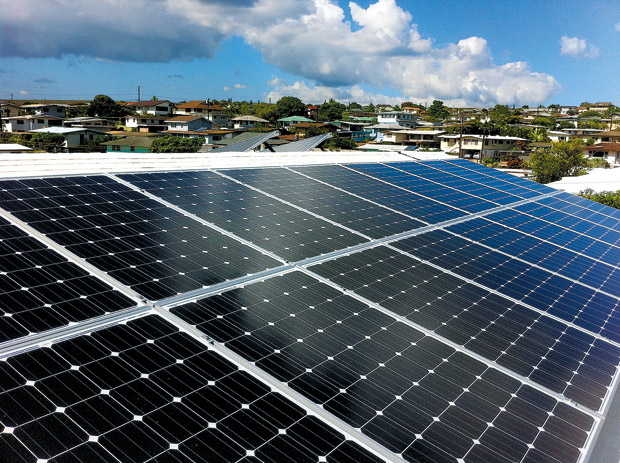Save green by ‘going green’ with energy storage
By Tasha Chang
With the rising cost of electricity in Hawaii, there’s a growing focus on renewable energy storage systems. What is an energy storage system? When paired with photovoltaic modules, the excess renewable energy would be routed into an energy storage system for later usage, without exporting back onto the grid. This solution gives homeowners the option to use the utility company as a backup or grid independent.
One thing to consider when exploring the energy storage unit solution is the actual makeup of the battery technology. If you are not a chemist or “in the know” of the latest technology, one question that is frequently asked is, “What are the differences between lithium iron phosphate and lithium ion batteries?”
Safety
Safety should be the No. 1 consideration. Because both battery technologies are re-chargeable, a lithium iron phosphate battery remains cool at room temperature while the lithium ion battery may suffer thermal runaway and heats up faster under similar charging conditions. Lithium iron phosphate is a nontoxic material, but lithium cobalt oxide is hazardous in nature, therefore, industry experts consider Lithium iron phosphate as a much safer material.
Performance
The lithium iron phosphate technology has increased battery density compared to the lithium ion. Density has a direct correlation with the number of cycles of discharge. Most lithium iron phosphate batteries will have a range starting at 10,000 cycles. Based on a 365-day calendar year, that’s a lithium iron phosphate life cycle of more than 27 years.
Cost-effective
When considering an energy storage purchase, it is good to know that these systems have a premium price tag; however, with most consumer goods, prices will trend downward over time. Early adopters of an energy storage system could experience monthly electricity bills down to zero and take full advantage of the current renewable energy tax credit privileges.
Also, you may not need to seek the approval of the utility company. Furthermore, while your neighborhood is experiencing a power outage, your home would be unaffected.
Finally, consider an energy storage purchase a long-term investment that can save you hundreds of thousands of dollars through the years.
Tasha Chang is the general manager of Hi-Power Solar.
HI-POWER SOLAR
contact // 342-0802
address // 98-723 Kuahao Place, A13
web // hipowersolar.com
